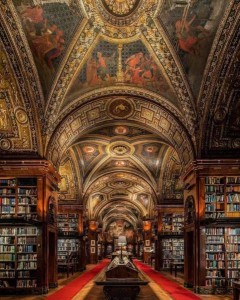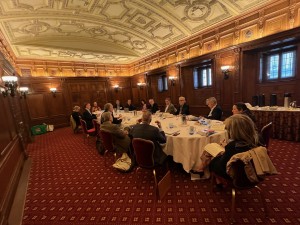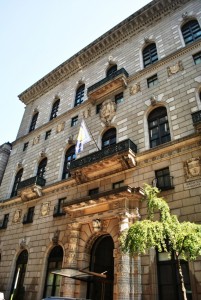The Gilded Age and The Dawn of The American Century
Professor Paul Grimstad, Yale University
Professor Esther da Costa Meyer, Princeton University
Professor David Nasaw, City University of New York
EverScholar in New York
November 13-16, 2025
The University Club, New York City
Course fee: $2395
Course is completed; however, it will be offered again in 2026!
We’ve all heard the term,”The Gilded Age.” In its popularly understood, even clichéd, conception, we think of a superficial urban celebration of unimaginable wealth and performative luxury. Momentous, surely, but also perhaps deeply troubling to our collective moral sensibility. EverScholar, where we bring you the greatest scholars of the most compelling subjects, will, as always, provide you with quite a different, deeper, and more nuanced understanding of this transformative period.
We have assembled a renowned faculty who will take you through the works of authors whose work was strikingly original then and remains compelling today; through period art and architecture that unlocks the sensibility of the time and still speaks to us, standing majestically, perhaps ostentatiously, in our greatest metropolis; through historical firsts, titanic figures, and social movements that continue to define our modern world.
November 13-16 in New York City, EverScholar is delighted to present a fascinating and deeply immersive, long-weekend study of this transformative era, running roughly from the end of the Civil War to the early 20th century. And where else would we conduct such an experience than in the period’s financial and cultural center — and, even more specifically, within the ornate private walls of New York City’s stately institutions where the elites of industry, society, and culture convened. As usual at EverScholar, we will gain access to special places and artifacts valuable to our study and not generally available to the public (some of these will be revealed soon, others, due to publicity prohibitions, will need to remain under wraps.)
Befitting the gourmand appetites of the era (ours scholarly more than culinary, but a bit of the latter too) and in true EverScholar fashion, we are preparing a many-layered intellectual feast! Together at the table, we will study intensively to get beneath the surface-level, popular understanding of this era and explore the intellectual, economic, and cultural ingredients that defined it. And, as usual, we will approach the subject with a variety of perspectives: literary, philosophical, historical, architectural, and art historical.
Yale Professor Paul Grimstad, Senior Lecturer and Director of Undergraduate Studies in the Humanities program, and leader of Yale’s legendary Directed Studies program, will guide our literature and intellectual history inquiry. With Paul, we will probe America’s emergence from adolescence as its own intellectual tradition develops. In-depth readings will include the comparative study of Henry James’ pre- and post-internationalist writing on New York City through his novels, stories, and criticism and alongside his brother William’s pioneering work in psychology. We will take up the philosophy of “pragmatism,” a distinctly American intellectual tradition and arguably the only true American philosophical school. We will consider questions of social belonging, philistinism, gentility, urban industrialization, immigration, cultural tourism, taste, status anxiety, provincialism, cosmopolitanism, the fetishization of cultural prestige, and self-reliance.
Princeton’s Professor Emeritus of History of Modern Architecture, Esther da Costa Meyer, will guide our study of fin de siècle connections between Europe and the economically-expanding and culturally-striving United States — centered, naturally, in New York City, but with financial and cultural tentacles developing and spreading across Europe. With Esther, we will explore this cross-Atlantic network of art dealers and markets and the material and cultural manifestations of this exchange; as well as the connections and tensions between these art worlds, old and new. Because our course takes place in masterpieces from the prestigious Gilded Age architecture firm of McKim, Mead and White, these buildings too will serve as illustrative objects of focus and discovery. We will address themes including self-representation and distinction, European imitation and ostentation, “conspicuous consumption,” social ritual, philanthropy and “reputation washing,” the rise of dealer networks in art and cultural artifacts, the role of cultured women in establishing public museums and collections, the influence of American cultural figures abroad, and the trading of wealth for titled prestige among America’s influential “dollar princesses.”
CUNY’s Arthur M. Schlesinger, Jr. Distinguished Professor of History, winner of the Bancroft Prize, short-listed for the Pulitzer Prize, winner of the New-York Historical Society prize, and native New Yorker, David Nasaw, directs our historical study of the Gilded Age period. David leads our exploration of the transformation of the U.S. into an inter-connected industrial powerhouse and the corresponding establishment of vast new private fortunes at the hands of the so-called “robber barons,” like Andrew Carnegie. But David will also move us out of New York City to understand this period in the American south and west and to the sources and drivers of this capital. Additionally under David, we will learn about the growth of new entertainments and the emergence of a popular culture within the new “public spaces” of the age and how these contributed to a national identity. Themes will include cultural transformation; wealth creation and extraction; regional and national identity; racial, ethnic, and class division; and American self-recognition.
With EverScholar, you will join a cohort of intellectually curious peers in an intimate, discussion-based symposium. You will undertake deep, fascinating, scholarly reading prior to the course to prepare for our time together and, specifically, for the three, 90-minute, highly-participatory discussion seminars conducted during each of our three full days together (fear not, there will be plenty of coffee breaks). Each day also includes an afternoon field trip to somewhere super-special (stay tuned!). Our accommodations will be in NYC’s spectacular University Club, a familiar Gilded Age home for our EverScholar courses. We will spend our meals together and with our faculty at sumptuous private clubs and top restaurants, often discussing the topics of our study but also making and renewing brilliant friendships.
This is a rare opportunity to study the Gilded Age beyond its common understanding and clichés, within its dynamic center, with friendly and fascinating peers, and with special access to the private spaces, rare artifacts, and the renowned scholars who bring it all to life. Whether you’re drawn to art, architecture, history, literature, or the philosophical origins of modern America, this course offers to gild you, our brilliant EverScholars, with a rich, interdisciplinary understanding of the forces that transformed our nation and our culture.
Our Lead Faculty:
Readings
All EverScholar courses actually start months before our meeting. After registration, you will receive all books and scholarly articles for the course, and will immerse yourself in great works curated by our faculty. “The Gilded Age and The Dawning of The American Century” is no exception, with works ranging from contemporaneous writings to great books written by your own EverScholar professors. Primary sources will mix with authoritative texts to produce night after night of joy as you prepare for your return to the life of the mind.
Special Events
Among EverScholar’s unique and most beloved features are our Special Events; sessions at a number of well-known (such as a museum or Art Gallery) or less-known centers of collection and learning. “The Gilded Age and The Dawning of The American Century” takes this to another level, as our seminar learning spaces will be in Gilded Age-built Clubs, and the secrets of these spaces will be revealed by their in-house curators in a bespoke, unforgettable session. In addition, we plan an excursion to a recently reopened New York treasure, and New York’s Architecture will form an outdoor classroom for yet another event.
Details on Special Events for this course will be posted soon; well in advance of the course. All events are subject to later confirmation.



Beyond the Classroom
Everything that happens during an EverScholar program is enhanced by the fact that it takes place in a learning-promoting environment.
This program takes place at the University Club of New York City, 1 West 54th Street, in the cultural center of Manhattan. Discounted housing is available at the University Club.
Learn more about the experience!



The course begins with a reception and dinner on Thursday…. and ends late Sunday afternoon. The program cost is $2,395 per person. Deposit is $500 per person. Balance is due on August 1, 2025. Refund and full COVID-19 refund policies are detailed on registration page (click on “Register Now” button above for this information along with accommodation details) – you can register without worries. Looking forward to seeing you there!



